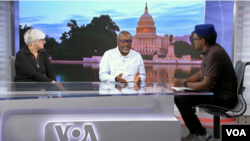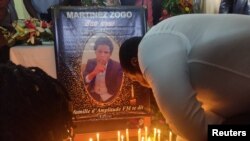"He came to my office, and he said 'they are going to kill me,'" Mana told VOA. "'They’re also coming after you,'" Zogo warned Mana. But, at the time, Mana thought the threats were a "bad joke."
Zogo had been receiving death threats for several weeks and his colleagues reported that he feared for his safety.
On Jan. 17, he sensed he was being followed and went to a nearby police station hoping for protection. He found none.
"The gates were closed," said Angela Quintal, the Committee to Protect Journalists', or CPJ's, Africa program director. "The police would not allow him in and he was dragged out of the car by four hooded men and taken outside of the police station."
Days later, on Jan. 22, Zogo's body was found near Soa, a suburb of the capital, Yaounde. He was naked and his body bore signs of torture and a gunshot wound to the head. Mana said he was so badly disfigured and mutilated that his wife could only identify him by one of his shoes left behind.
But even after his passing and the ongoing process of holding his killers accountable, Zogo's family says they are still receiving threats. Pierre Menye, a relative of Zogo’s widow, Diane, told VOA that assailants want to retrieve documents collected by the late journalist.
"[Diane Zogo and her] children need protection, without which they may be silenced by officials who are currently under investigation for killing Zogo," he said.
CPJ reported that Zogo had been investigating allegations of corruption involving media mogul Jean-Pierre Amougou Belinga. Belinga was arrested and charged with complicity in Zogo's torture on March 4. Belinga's lawyer has denied the charges and says the arrest is "unlawful." A bail hearing is expected later this month.
Press freedom in Cameroon has been declining according to watchdogs with journalists facing harassment, arrest and intimidation for their work. The number of independent news outlets has also been declining.
"The killing of Zogo is a tragic reminder of the dangers that journalists face in Cameroon and the urgent need for the authorities to protect journalists and ensure that those responsible for attacks against them are held accountable," Quintal said.
An investigation by The Africa Report, an English-language quarterly magazine, into the business dealings and political connections of Belinga, alleged that Belinga uses his media empire to promote his own interests and to intimidate and silence critics, including journalists like Zogo.
Belinga rose to prominence in the 1990’s and has close allies within the cabinet of longtime President Paul Biya. His newspaper L’Anecdote became notorious in 2006 when it published a list of 50 prominent Cameroonians who were allegedly homosexual.
Among the more than a dozen people who were arrested in connection to the murder is Thomas Raymond Etoundi Nsoé, a former commander of Cameroon’s presidential guard who is Belinga’s father-in-law and Léopold Maxime Eko Eko, head of the General Directorate of External Intelligence. The prominence of the suspects adds to the climate of fear.
"That is a very difficult situation because, as a citizen, you don't know if you could have confidence to a policeman a gendarme or a military man," Mana said. "You don't know because he could be the one killing you."
Qunital said acts of violence like this against journalists are intended to cow and silence the press.
"Clearly this was a gruesome murder. And we need to ensure that there's some sort of accountability," she said. "Because, unfortunately, when you silence a journalist, you silence a journalist for good, but you also silence others around who are scared."









